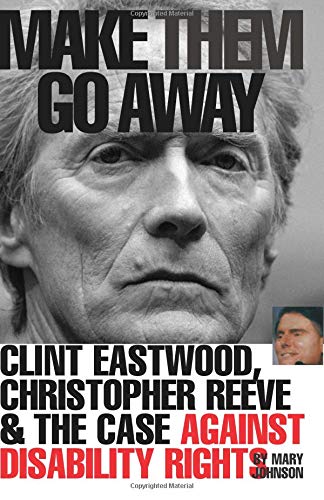Clint Eastwood, Christopher Reeve & the Case Against Disability Rights
Nonfiction by Mary Johnson.
 In the spring of 2000, actor Clint Eastwood took on the 10-year-old Americans with Disabilities Act. His Mission Ranch hotel in Carmel, California, had been sued for access violations under the law, and he’d been slapped with a lawsuit he’d never seen coming, he said….
In the spring of 2000, actor Clint Eastwood took on the 10-year-old Americans with Disabilities Act. His Mission Ranch hotel in Carmel, California, had been sued for access violations under the law, and he’d been slapped with a lawsuit he’d never seen coming, he said….
“What happens is these lawyers, they come along and they end up driving off in a big Mercedes,” Eastwood told reporters, “and the disabled person ends up driving off in a wheelchair.” In the days leading up to the hearing, Eastwood appeared on the talk shows Hardball and Crossfire; he was covered in a Fox News Special. The National Journal quoted him. Columnists covered his comments. Newsweek used the “Mercedes” quote on its “Perspectives” page. The seasoned Hollywood actor had his script and he stuck to it: He wasn’t against disabled people. He wanted to help disabled people, who were being preyed on by moneygrubbing lawyers. The law was the problem; had been all along. The law needed to be fixed. …
— from Make Them Go Away
A gripping read and an awakening.
— Lucy Gwin, editor, Mouth magazine.
“Imagine an African American’s voting rights withheld until he or she proved 100 percent African American descent, or a woman having to sue her employer to get a women’s restroom in the workplace. Outrageous as those scenarios seem, their like is commonplace in the lives of the disabled, Johnson says, because of widespread misinterpretation and misapplication of the Americans with Disabilities Act (ADA). She points out numerous flaws in the law, beginning with its title (she prefers that of the British analog, the Disability Discrimination Act) and including the fact that it is enforceable only via lawsuit, putting rights seekers in an adversarial position, and that it contains an escape clause permitting noncompliance if accessibility causes a business “undue hardship.” The disabled person’s difficulties aren’t, however, confined to the law, and the roots of conflict over disability rights reach deep into personal prejudices and national values. Bit-by-bit Johnson deconstructs arguments against disability rights from the likes of Clint Eastwood as well as more ordinary folk, and she constructs powerful reasons why we all benefit from inclusion.” –Booklist
“Everyone cares for disabled people, right? What they don’t care for are genuine civil rights for disabled people. MARY JOHNSON tells the tortuous, enraging story of how Congress enacted a law that instead of protecting against discrimination has turned ‘the disabled’ into a political punching bag.” –William Greider, national affairs correspondent, The Nation.
“You really need to read this book. If it makes you grit your teeth, read it anyway. It will help you explain to others why we need to change our way of thinking about disability rights in general and the Americans With Disabilities Act in particular.” — David P. Rundle, The Wichita Eagle
Make Them Go Away “reveals the animus against disability underlying all those sweetly written op-ed pieces, and … challenges us to oppose the mindset that puts the civil rights of all Americans at the mercy of the marketplace.” — Douglas Lathrop, New Mobility
“In challenging us to imagine a more accessible living environment, Johnson outlines why we all have a stake in creating such a society,…it’s the one minority that anyone can join in an instant… Viewed this way, accessibility becomes a matter of self-interest for everyone. [I]f America is to live up to its promise as a place of opportunity for all, then this is a discussion we desperately need to have. Johnson’s thoughtful, carefully argued book is an important contribution to that dialogue, and an excellent place to start.” — Martha Barnette, The (Louisville) Courier-Journal
“I found Make Them Go Away invaluable in forming our arguments to convince Governor Gray Davis, Attorney General Bill Lockyer and the Medical Board of California to stop the Medical Board of California v, Hason appeal to the U.S. Supreme Court.” — California activist HolLynn D Lil.
296 pp. Paperback
$16.95
ISBN 097211890X | Copyright 2003
Print | Kindle | ePub
